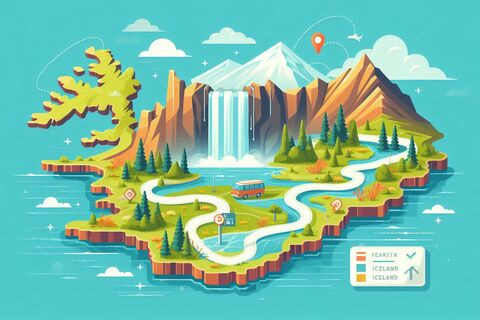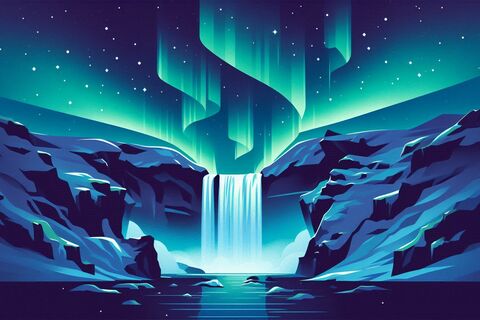Camping in Iceland
Camping in Iceland offers a unique opportunity to connect with the country’s pristine and wild nature. With breathtaking landscapes, majestic waterfalls, volcanoes, and glaciers, Iceland is one of the world's most sought-after camping destinations. Whether you choose to camp in a tent, campervan, or caravan, it's important to be well-prepared to handle the sometimes unpredictable weather and specific local regulations.
This comprehensive guide provides essential tips to make the most of your camping experience in Iceland, covering the local rules, must-have equipment, best camping seasons, and the top places to stay.
Types of camping in Iceland
Tent camping
Tent camping is ideal for adventure-seekers. Icelandic campsites are generally well-equipped with facilities like showers, toilets, and sometimes even kitchens. However, weather conditions can be harsh, especially outside the summer months. Make sure you have a sturdy, waterproof, and wind-resistant tent.
Campervan and RV camping
Camping in a campervan or RV is a popular option in Iceland. It offers more comfort and protection against the elements than a tent, along with greater flexibility. Many Icelandic campsites provide service areas for campervans with access to electricity, water, and chemical toilet disposal.
Glamping
For those who want to experience nature without sacrificing comfort, glamping (glamorous camping) is becoming increasingly popular in Iceland. You’ll find spacious tents or cabins equipped with beds and modern amenities, offering a more luxurious camping experience.
Camping regulations in Iceland
Wild camping: is it allowed?
Wild camping, once widely accepted, is now regulated to protect Iceland's fragile nature. Since 2015, it is prohibited to camp outside designated campsites if you are on private land or within a national park. However, in remote areas where no campsites are available, you can camp for one night, as long as you are away from farms or buildings.
For campervans or RVs, overnight parking is only allowed in designated campsites. It is illegal to stay overnight in parking lots or on the side of the road.
Environmental respect
Environmental respect is crucial in Iceland. Always leave no trace, dispose of waste properly, and follow local guidelines. Do not damage vegetation or disturb wildlife.
Best times for camping in Iceland
Summer camping (June to August)
Summer is the best time for camping in Iceland. Temperatures are milder (between 10-15°C or 50-59°F), and the days are long, thanks to the midnight sun, which provides nearly 24-hour daylight. During this period, almost all campsites are open, and the Highland roads are accessible.
Fall and spring camping (September-October and April-May)
Fall and spring offer spectacular scenery with fewer tourists. However, temperatures can be cooler, and some campsites close after summer. These seasons are great for avoiding crowds and witnessing the Northern Lights.
Winter camping (November to March)
Winter camping is for the more adventurous and requires thorough preparation. Cold temperatures, short days, and challenging road conditions due to snow are common. However, for those well-equipped, winter camping can provide a unique experience, especially for viewing the Northern Lights.
Essential camping gear for Iceland
For tent camping
- Wind- and rain-resistant tent: Iceland’s winds can be strong, so ensure your tent can withstand harsh conditions.
- Four-season sleeping bag: Night temperatures, even in summer, can drop below 5°C (41°F).
- Insulated sleeping pad: A quality sleeping pad will help protect against cold ground temperatures.
- Waterproof clothing and layers: Icelandic weather is unpredictable, so bring layers to adapt to changing conditions.
- Portable gas stove: Many campsites are remote, so a stove will allow you to prepare meals easily.
For campervan or RV camping
- Water supply: Make sure you have enough drinking water, especially if you’re traveling to remote areas.
- Portable heater: Nights can be cold, even inside a vehicle.
- Cooler or mini-fridge: Essential for keeping food fresh during the long summer days.
- Maps and guides: While GPS is useful, having a physical map can be crucial in remote areas where signal may be limited.
The best campsites in Iceland
Reykjavik and surrounding areas
- Reykjavik Campsite: The largest campsite in Iceland, conveniently located near the city center, making it an ideal starting or ending point for your road trip.
- Thingvellir National Park Campsite: Located near the famous tectonic rift, perfect for history and nature enthusiasts.
South coast
- Vik Campsite: Ideal for exploring the black sand beaches and Dyrhólaey cliffs.
- Skaftafell Campsite: Close to Vatnajökull National Park, offering stunning glacier views.
East Iceland
- Seyðisfjörður Campsite: Located in a picturesque fjord, this is a peaceful spot for nature lovers.
- Egilsstaðir Campsite: A great base for exploring the east of the island.
North Iceland
- Myvatn Campsite: Perfect for those looking to explore the geothermal wonders and hot springs of the Myvatn area.
- Akureyri Campsite: Situated near Iceland's second-largest city, offering easy access to local amenities.
Westfjords
- Ísafjörður Campsite: Nestled in the stunning Westfjords, a perfect base for exploring this remote region.
- Látrabjarg Campsite: Close to the famous bird cliffs, where you can see puffins in the summer.
Highlands
- Landmannalaugar Campsite: Popular among hikers, this site offers access to volcanic landscapes and natural hot springs.
- Kerlingarfjöll Campsite: A great location for exploring colorful mountains and geothermal areas.
Practical tips for a successful camping trip
Book in advance
During the summer months, some campsites can get crowded, especially near popular tourist spots. It’s advisable to book in advance, particularly if you're traveling in a campervan or RV.
Carry cash
Although most campsites accept card payments, some smaller or more remote campsites may only take cash. Be prepared by carrying some Icelandic króna.
Prepare for unpredictable weather
Iceland’s weather is notoriously changeable. Even in summer, you may encounter heavy rain or strong winds. Always pack for all-weather conditions.
Conclusion: a unique adventure in nature
Camping in Iceland offers an unforgettable experience, allowing you to immerse yourself in the country’s awe-inspiring landscapes. Whether you prefer the simplicity of tent camping or the comfort of a campervan, Iceland has a wide range of options for nature lovers. By following the local regulations and being prepared for the elements, you can fully enjoy your Icelandic adventure safely and responsibly.
Happy camping in Iceland!



